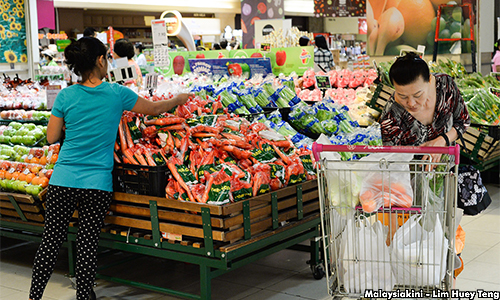LETTER | Many have been wondering why I have been so quiet of late. Apart from contributing to Voiz Asia, I hardly make any comments on topics that I feel passionate about.
It’s not because I have given up hope on Pakatan Harapan, but it is because of a few incidents that took place.
It is all linked to a few common factors: corruption and a lack of control by government agencies, increase in prices of goods and services, and the weak ringgit.
A second-hand car, although purchased just two months ago, developed a radiator problem.
My daughter developed a high fever and had to be on medical leave for four days. When we had to send her to the hospital, it cost us RM600.
Then, my wife’s car which we were depending on also decided to give way, which cost RM500 to fix.
Meanwhile, I can only commute using Grab and each round trip to pick up my children from school costs at least RM15.
Mind you, we are only working class people who may be on the slightly higher middle-income level, yet we are feeling the pinch. I wonder how the lower income group is struggling to make ends meet.

Unlike the minister in the Prime Minister's Department in charge of the Economic Planning Unit Abdul Rahman Dahlan (photo), who earns a minster’s pay and all the “perks” that go along with it, we just want a decent life, without all the extravagance. Yet we are finding that the country’s economy is going nowhere.
Since the last quarter, things have slowed down a lot. So, when, Rahman said that GDP contributes to “strong economic growth has benefited people in terms of rising income and purchasing power,” I cannot help but say the minister understands next to nothing about the economy and how it affects ordinary people on the street.
The GDP of the country may be growing at five percent and the inflation rate may be kept very low at one percent, but what does this all mean to the ordinary person?
Several sectors of the economy contribute to the GDP. In some sectors, we cannot deny that business is still very good. This is what is driving the economy.
It is for this same reason that when times are bad, good governments invest heavily in infrastructure to boost the economy and public confidence. This is to ensure that the country’s GDP is still growing.
When the economy is too robust, the government then puts on a lower gear, raises the base lending rates, and does everything within its control to prevent a bubble burst. These are basic economic principles as far as I understand it.

The per capita income for a country can be very high, but that is merely based on the country’s total monetary measure of the market value of all final goods and services produced in a period divided by the per capita population.
On average, if our per capita income is higher than another country like Thailand, it does not mean that Malaysians are on average richer than the Thais.
The per capita income depends on the total population. If the population is huge, the per capita income is lower than that of the other nation with a smaller population.
Therefore, the minister should also know that per capita income cannot be used as a benchmark to gauge the disposable income of the country’s population and its purchasing power.
This is why Abdul Rahman has failed to understand the comments by Mydin managing director Ameer Ali Mydin and what he meant when he said that despite a rosy picture of the country’s economic growth, in Q3 last year, the country’s retail industry contracted 1.1 percent. He further added that “hypermarket business dropped by five percent.”
These are facts that Abdul Rahman fail to grasp. Sometimes, I wonder from which university he had graduated, but I, despite having only a science degree, am able to tell the minister that he has to go back to the basics and stop looking foolish with his comments again.
The purchasing power and the disposable income of most Malaysians have been reduced substantially over the past few years due to huge loans (housing, car and others) and now, lagging salary increments compared to the rise in the cost of living.

Since the implementation of the goods and services tax (GST), personal income tax has also not been reduced to address the financial woes of the middle-income wage earners. This is why ordinary Malaysians are just waiting for a change of government.
Corruption has also caused the cost of living to increase while reducing the quality of our lives. For example, a project may cost only RM1 million, but it is raised to RM2 million, hence, when the people have to pay to use the facilities, the cost is now doubled and 'justified' by the final cost of the project.
Meanwhile, with the Ali Baba economy that our country is well-known for, the project may cost RM1 million, but when it is further cascaded down, the contractor awarded the job may only receive a fraction of the tender. With that amount, he can only provide substandard work.
Hence, for the average person, it is not only our disposable income which is reduced, but we also find that the quality of life has also dropped.
Instead of rebutting Ameer, Abdul Rahman should urge the cabinet to consider reducing the GST or totally remove it with immediate effect. It is this GDP that has sent the prices of goods and services spiralling up, and the GST has also killed some of the competitors.
Until something is done to address the woes created in recent years, on paper, the country may register a high GDP, but the people’s purchasing power continues to diminish.
STEPHEN NG is an ordinary citizen with an avid interest in following political developments in the country since 2008.
The views expressed here are those of the author/contributor and do not necessarily represent the views of Malaysiakini.

